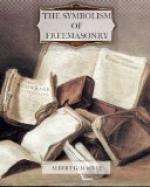“We may disguise it as we will,” says Bro. Lodor, “we may evade a scrutiny of it; but our character, as it is, with its faults and blemishes, its weaknesses and infirmities, its vices and its stains, together with its redeeming traits, its better parts, is our speculative temple.” And he goes on to extend the symbolic idea: “Like the exemplar temple on Mount Moriah, it should be preserved as a hallowed shrine, and guarded with the same vigilant care. It should be our pearl of price set round with walls and enclosures, even as was the Jewish temple, and the impure, the vicious, the guilty, and the profane be banished from even its outer courts. A faithful sentinel should be placed at every gate, a watchman on every wall, and the first approach of a cowan and eavesdropper be promptly met and resisted.”
Teachings like this are now so common that every American Mason who has studied the symbolism of his Order believes, with Carlyle, that “there is but one temple in the world, and that is the body of man.”
This inquiry into the meaning and object of labor, as a masonic symbol, brings us to these conclusions:—
1. That our ancient brethren worked as long as the operative art predominated in the institution at material temples, the most prominent of these being the temple of King Solomon.
2. That when the speculative science took the place of the operative art, the modern Masons, working no longer at material temples, but holding still to the sacred thought, the reverential idea, of a holy temple, a Lord’s house to be built, began to labor at living temples, and to make man, the true house of the Lord, the tabernacle for the indwelling of the Holy Spirit.
And, 3. Therefore to every Freemason who rightly comprehends his art, this construction of a living temple is his labor.
“Labor,” says Gadicke, the German masonic lexicographer, “is an important word in Masonry; indeed, we might say the most important. For this, and this alone, does a man become a Freemason. Every other object is secondary or incidental. Labor is the accustomed design of every lodge meeting. But does such meeting always furnish evidence of industry? The labor of an operative mason will be visible, and he will receive his reward for it, even though the building he has constructed may, in the next hour, be overthrown by a tempest. He knows that he has done his labor. And so must the Freemason labor. His labor must be visible to himself and to his brethren, or, at least, it must conduce to his own internal satisfaction. As we build neither a visible Solomonic temple nor an Egyptian pyramid, our industry must become visible in works that are imperishable, so that when we vanish from the eyes of mortals it may be said of us that our labor was well done.”
And remembering what the apostle has said, that we are the temple of God, and that the Spirit of God dwelleth in us, we know that our labor is so to build that temple that it shall become worthy of its divine Dweller.




